The Historic Debut of Jackie Robinson
April 15, 1947, stands out as a monumental day in the annals of Major League Baseball (MLB) history. It was on this day that Jackie Robinson shattered the color barrier, becoming the first African American to play in the MLB in the modern era. By joining the Brooklyn Dodgers, Robinson’s debut was more than just a significant milestone for the baseball community; it was also a pivotal event in the broader American civil rights movement. The introduction of Jackie Robinson into MLB initiated significant discussions and actions regarding racial equality throughout the country.
Early Challenges and Adaptation
The path to integration in MLB was fraught with challenges, both overt and subtle. Jackie Robinson, as the pioneering African American player, faced intense racism and discrimination. This came not only from fans but also from opposing players and, at times, his teammates. The pressure to perform amidst these adversities was immense, yet Robinson’s resilience shone through. His ability to maintain composure and showcase his talents in such a hostile environment spoke volumes of his courage and determination. Overcoming these early challenges was pivotal for his career and the broader movement towards integration in professional sports.
Despite the adversity, Robinson’s performance on the field was exemplary. His phenomenal play earned him the Rookie of the Year award in that first year, 1947. For an individual facing such significant off-field pressure, this accolade was a testament to his skill and focus. The initial years were filled with learning, adaptation, and an incredible display of mental strength.
Performance and Statistics
Throughout his ten-season career with the Dodgers, Jackie Robinson was an advocate for racial equality both on and off the field. His prowess as an athlete was undeniable. Robinson achieved an outstanding batting average of .311, a statistic that underscores his skill at the plate. In 1949, his stellar performance was recognized with the National League Most Valuable Player (MVP) award, further cementing his place among baseball’s greats.
Robinson’s teams also consistently reached high levels of competition, as evidenced by his participation in six World Series. His contributions were integral to the Dodgers’ successes during this era. For those interested in exploring Robinson’s statistics in more detail, they can be found on the official MLB website. His career stats provide a clear picture of his influential role in the game and his groundbreaking achievements on the field.
Long-term Impact on MLB
Jackie Robinson’s integration into Major League Baseball had a widespread impact on the league. His entry into MLB was the catalyst that inspired a dismantling of racial barriers across the league. By 1959, every MLB team had welcomed at least one African American player into their ranks. This shift was not merely about increasing diversity within teams but was an early and prominent example of progress in American sports.
The legend of Jackie Robinson created a ripple effect; it opened doors for countless budding athletes from diverse backgrounds. His courage and performance on the field were instrumental in paving the way for future generations of professional athletes, ensuring talent could be recognized irrespective of race. Robinson laid down the groundwork for future discussions and steps toward equality and inclusivity in professional sports. His influence extended beyond baseball, signifying a change in societal perspectives about race and equality.
Legacy and Recognition
Jackie Robinson’s enduring legacy is not only ingrained in the history of MLB but also in the fabric of American cultural history. In recognition of Robinson’s pivotal role and lasting impact, Major League Baseball retired his jersey number, 42, across all teams in 1997. This act of retiring his number was a tribute to his profound impact on the sport and American culture.
Such recognition is further extended each year on April 15th, when MLB observes Jackie Robinson Day. On this day, all players across the league don the number 42, highlighting their collective tribute to Robinson’s immense contributions to the game and society at large. It is a day that celebrates not only his athletic achievements but also his significant role in advancing civil rights through sport.
Jackie Robinson’s story is a compelling narrative of perseverance, determination, and athletic excellence. It is a narrative that continues to serve as an inspiration to athletes and individuals across the globe. The resonating impact of his career and character continues to inspire subsequent generations to strive for excellence while advocating for justice and equality. Robinson’s journey exemplifies the profound and enduring influence sports can have on society. It highlights the role of athletes as catalysts for global social change and progress.





